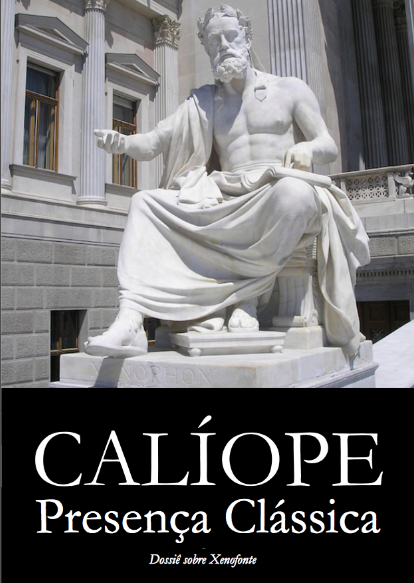La inteligencia del cazador. Virtudes intelectuales, filosofía y sofística en Jenofonte y Aristóteles
DOI:
https://doi.org/10.17074/cpc.v1i41.35630Palavras-chave:
Ethics, Virtues, Aristotle, Xenophon,Resumo
In this work, I will first propose an approach to Aristotle's analysis of the intellectual virtues in the last part of Nicomachean Ethics, VI as an integrated system that shows the role of φρόνησις concerning the production of moral judgment and the moral act. Then, on this basis, I will examine Xenophon's use of these notions by showing the links with Aristotle's device. Finally, I will analyze to what extent both approaches are based on shared foundations and what are the contributions of this scheme to differentiate judgments and actions according to the practical wisdom from equivocal variants that seem virtuous without being so. In this way, the exploration of the intellectual virtues will allow weighing up the opinion of both philosophers on the conditions for true philosophy and the theoretical tools to differentiate it from sophistical options, highlighting Aristotle and Xenophon's strategies to "hunt the sophist".
Downloads
Referências
Referencias
Allier, L. (2018), "Why did Xenophon write the last chapter of the Cynegeticus", in G. Danzig, D. Johnson, D. Morrison (Eds.) (2018), Plato and Xenophon, Leiden, Brill.
Aubenque, P. (1963), La prudence chez Aristote, Paris, Quadrige.
Aubenque, P. (1965), "La prudence aristotelicienne porte-t-elle-su la fin ou sur les moyens?", Revue des études grecques, 78, pp. 40-51.
Berti, E. (2008), "Ragione pratica e normatività in Aristotele", in E. Berti, Nuovi studi aristotelici, vol. III: filosofia pratica, Brescia, Morcelliana.
Biondi Khan, C. (2005), “Aristotle’s Moral Expert: The phronimos”, in Rasmussen, L. (ed.), Ethics Expertise, Dordrecht, Springer.
Boisacq, E. (1909) Dictionnaire étymologique de la langue grecque, Heidelberg et Paris, Winter.
Bostock, D. (2000), Aristotle’s Ethics,. Oxford, Oxford University Press.
Brancacci, A. (1990), Oikeios logos. La filosofia del linguaggio di Antistene, Napoli, Bibliopolis.
Charles, D. (1984), Aristotle's Philosophy of Action, London, Duckworth.
Cooper, J. (1984), "Plato’s Theory of Human Motivation", History of Philosophy Quarterly 1, 3–21
Corey, D. (2002), "The case against teaching virtue for pay: Socrates and the Sophists", History of Political Thought, 23.2, pp. 189-210.
Danzig, G., Johnson, D., & Morrison, D. (Eds.) (2018), Plato and Xenophon, Leiden, Brill.
Dorion, L. (2017), "Xenophon and Greek Philosophy", in M. Flower (Ed.), The Cambridge Companion to Xenophon, Cambridge, CUP.
Doty, R. (2003), "Figures of Speech: Philological Argument for and against Xenophon’s Authorship of Cynegeticus", Manuscripta, 45, pp. 19-24.
Ernout, A., Meillet, A. (1932), Dictionnaire étymologique de la langue latine. Histoire des mots, Paris, Klincksieck.
Gauthier, R. and J. Jolif (1970), Éthique à Nicomaque, vol. II, tom. I-II: Commentaire, Louvain, Peeters.
Gray, V. J.(1985), “Xenophon's 'Cynegeticus'”, Hermes, 113.2, pp. 156–172.
Hardie, W. (1980), Aristotle's Ethical Theory, Oxford, Clarendon Press.
Irwin, T. (1988), Aristotle’s First Principles, Oxford, OUP.
Johnson, D. (2005), "Persians as Centaurs in Xenophon's" Cyropaedia", Transactions of the American Philological Association, Boston, Johns Hopkins University Press.
Kidd, S. (2014), "Xenophon's Cynegeticus and its Defense of Liberal Education", Philologus, 158.1.
Labiano, M. (2012), "The Problem of Authorship of Xenophon's Cynegeticus", in J. Martínez (Ed.), Mundus vult decipi. Estudios interdisciplinares sobre falsificación textual y literaria, Madrid, Ediciones Clásicas.
Louden, R. (1997), ‘What is Moral Authority? Euboulia, synesis and gnom vs. phronesis’. Ancient Philosophy, 17.1, 103-18.
Marsico, C. (2005), “Argumentar por caminos extremos. II. La necesidad de pensar lo que es. Antístenes y la fundamentación semántica de la noción como adecuación”, en L. Castello et al (Eds.), El lenguaje como problema entre los griegos: ¿Cómo decir lo real?, Buenos Aires, GEA.
Marsico, C. (2010), Zonas de tensión dialógica. Perspectivas para la filosofía antigua, Buenos Aires, del Zorzal.
Marsico, C. (2019), “About the common grounds of the Socratic Philosophies: the Anthropological Core”, Acta Classica, 62.
Moore, C. (2018), "Xenophon on 'Philosophy' and Socrates", in Danzig, G., Johnson, D., & Morrison, D. (Eds.). (2018). Plato and Xenophon. Leiden, Brill.
Moss, J. (2011), "Virtue Makes the Goal Right: Virtue and Phronesis in Aristotle’s Ethics", Phronesis, 56.2, pp. 204–61.
Natali, C. (2001), The Wisdom of Aristotle, New York, SUNY Press.
Natali, C. (2014), "The Book on Wisdom", in R. Polansky (ed.), The Cambridge Companion to Aristotle’s Nicomachean Ethics, Cambridge, CUP.
Polansky, R. (ed.) (2014), The Cambridge Companion to Aristotle’s Nicomachean Ethics. Cambridge: Cambridge University Press.
Russell, D. (2009) Practical Intelligence and the Virtues, Oxford, OUP.
Thomas, D. (2018) "The Enemies of Hunting in Xenophon's Cynegeticus", in Danzig, G., Johnson, D., & Morrison, D. (Eds.). (2018). Plato and Xenophon. Leiden, The Netherlands: Brill.
Urmson, J. (1988) Aristotle's Ethics, Oxford, Blackwell.
Walter, J. (1874), Die Lehre von der praktischen Vernunft in der griechischen Philosophie. Jena: Mauke.
Downloads
Publicado
Edição
Seção
Licença
Autores que publicam nesta revista concordam com os seguintes termos:
Autores mantém os direitos autorais e concedem à revista o direito de primeira publicação, com o trabalho simultaneamente licenciado sob a Licença Creative Commons Attribution que permite o compartilhamento do trabalho com reconhecimento da autoria e publicação inicial nesta revista.
Autores têm autorização para assumir contratos adicionais separadamente, para distribuição não-exclusiva da versão do trabalho publicada nesta revista (ex.: publicar em repositório institucional ou como capítulo de livro), com reconhecimento de autoria e publicação inicial nesta revista.
Autores têm permissão e são estimulados a publicar e distribuir seu trabalho online (ex.: em repositórios institucionais ou na sua página pessoal) a qualquer ponto antes ou durante o processo editorial, já que isso pode gerar alterações produtivas, bem como aumentar o impacto e a citação do trabalho publicado (Veja O Efeito do Acesso Livre).


